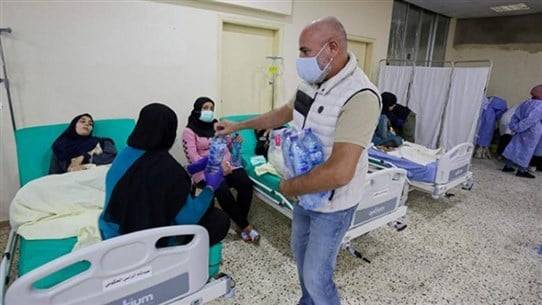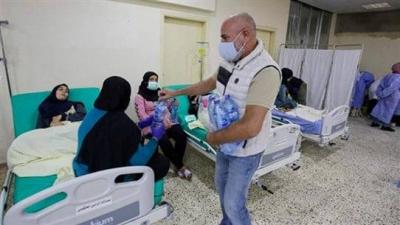The "COVID-19 posters" have been overshadowed in the Ministry of Public Health building by the rampant spread of cholera, as the cumulative number of cases surpassed 300 yesterday, with new fatalities recorded. Suspected cases are nearing a thousand, all within a span of just three weeks. This situation signals that things are not going well. To prevent the epidemic from getting out of control, the Ministry of Public Health has begun to work on the cholera vaccine, sending a request to the World Health Organization for vaccine supplies to Lebanon, which received approval yesterday.
In this context, Minister of Public Health, Firas Abiad, announced in a press conference dedicated to the cholera updates and vaccination strategy that a letter arrived from the International Coordinating Group for Vaccine Supply under the World Health Organization, pledging to provide Lebanon with around 600,000 doses of the vaccine, expected to arrive within the next two weeks. According to ministry sources, Lebanon is also anticipated to receive a donation of approximately 10,000 doses of the cholera vaccine.
These vaccines are set to arrive at the central drug warehouse in Karantina, awaiting the Vaccine Committee formed by the Ministry of Health to prepare and implement a national vaccination distribution plan, which Abiad expects to finalize within a month.
### Target Groups
Previously, the Ministry of Health announced that the vaccines would not be available to the general public but rather to specific groups defined epidemiologically as the most at risk. In this context, Dr. Abdul Rahman Al-Bizri, a specialist in infectious diseases, divides the targeted groups into two categories:
- **First Category**: Those most exposed to the epidemic, including areas where cholera has begun and spread, such as Syrian refugee camps, as well as prisons, which are considered potential hotspots if cholera reaches them.
- **Second Category**: Individuals in contact with the epidemic, including health workers, doctors, field hospitals, and government hospitals receiving cholera patients.
### Protection for Three Months
The cholera vaccine is administered orally, and according to Al-Bizri, a single dose "suffices to provide good protection lasting about three months." He suggests that this margin of protection gives "breathing room" for the ministry to control the epidemic, but this is contingent on simultaneously working on sustainable solutions to the problems underlying cholera's spread, primarily infrastructure issues. Al-Bizri reiterates that "the vaccine will not replace other options such as ensuring clean water, treating sewage, and monitoring agriculture and livestock." In short, "the state must fulfill its responsibilities, represented by the relevant ministries."
### Hospital Preparedness
Not far from the task of mapping out vaccine distribution, another effort relates to the readiness of hospitals to accommodate the impending epidemic and the capacity of human resources to face this "battle," as termed by Abiad. In this regard, the Ministry of Health has formed a committee for public hospitals and field hospitals aimed at studying service delivery conditions concerning cholera, ensuring quality standards, and providing necessary training for human teams.
As of now, the hospitals participating in the response to the epidemic are still limited to the public hospitals, totaling six, currently treating 70 patients: Akkar - Halba, Nini - Tripoli, Tripoli Governmental Hospital, Hermel Governmental Hospital, Hariri University, and Baabda Governmental Hospital. Additionally, the field hospital in the Bebnin Akkar area and other field hospitals being prepared in Ser el-Dinniyeh, Arsal, and Bar Elias may need to be established depending on new outbreak focal points.
The Ministry of Public Health has also sent a letter to the Ministry of Interior and Municipalities to announce the opening of laboratories in public hospitals free of charge for municipalities to conduct water tests. The ministry is also coordinating with the Red Cross to trace water tankers to identify water sources and ensure that their owners adhere to disinfecting these waters.




